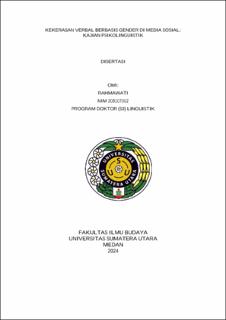Kekerasan Verbal Berbasis Gender di Media Sosial: Kajian Psikolinguistik
Gender Based Verbal Violence on Social Media: Psycholinguistic Studies

Date
2024Author
Rahmawati, Rahmawati
Advisor(s)
Gustianingsih
Deliana
Syarfina, Tengku
Metadata
Show full item recordAbstract
The study was supported by the implementation of the framework of
Psycholinguistic Studies with a focus on gender-based verbal violence on social
media accounts on Instagram and TikTok. This study uses the behavioral
psycholinguistic theory pioneered by John B. by Watson. This type of research
is conducted using a qualitative descriptive approach. Research samples are
taken using purposive sampling techniques based on specific considerations in
accordance with the research objectives. Data collection techniques use
observation and documentation techniques. Data analysis activities include
data reduction, data presentation, and conclusion drawing. The data in the
study consisted of comments written in verbal violence on social media,
consisting of 534 forms of verbal hardship in Instagram and TikTok media
accounts, which were delivered by netizens who wrote their comments on other
people’s media account The results of this research were the first to find several
forms of verbal violence in various situations, eight forms of verbal violence
were found, namely the form of verbal violence, shouting, namely 5 (5.9%), the
second form of verbal violence, cursing, namely 41 (48.38%), the third form
verbal violence giving negative nicknames/labelling 15 (17.7%), fourth form of
verbal violence isolating/embarrassing 36 (42.48%), fifth form of verbal
violence insulting abilities 3 (3.54%), sixth form of verbal violence blasphemy
3 (4.72%), the seventh form of verbal violence, body shaming, 5 (5.9%), and
the eighth form of sexual harassment, 9 (10.62%). The results of the analysis of
forms of gender-based verbal violence on social media on Instagram and
TikTok accounts found four, namely the first form of verbal violence in the form
of words, namely 92 (31%), the second form of verbal violence in the form of
phrases, namely 65 (20%), the third form of verbal violence in the form of
clauses 150 (48%), the four forms of verbal violence in the form of sentences 9
(1%). The results obtained on the stimulus and response to verbal violence
conveyed and received by gender on social media found three principles, the
first of which emphasizes conditioned responses as an element or construct of
the perpetrator, amounting to 35 (35%), second, behavior is learned as a
consequence of environmental influences, amounting to 42 (42%), the third
focused on animal behavior totaling 23 (23%). Based on the results of data
analysis from all problem formulations, there are several functions of verbal
violence, namely to insinuate, humiliate and to express dislike and anger.
